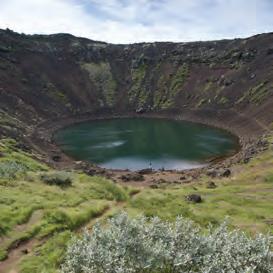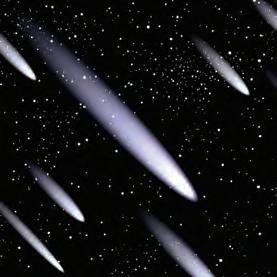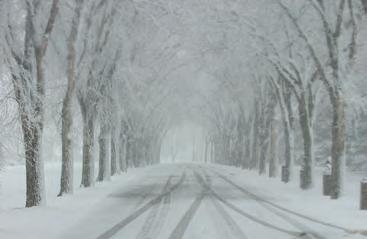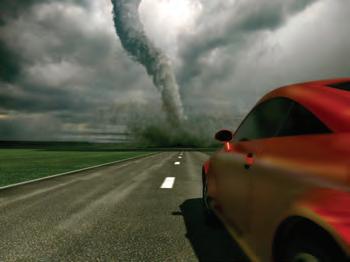
15 minute read
A threat from the universe
from Engleski 1
As you are reading, underline parts of the texts which are related to the questions. When you finish reading, go back to the questions and answer them.
1. Why do only bigger meteorites and comets reach the Earth’s surface? 2. How did the scientists learn about the age of the Solar System? 3. How often do asteroids actually crash into our world? 4. What caused the dinosaurs to become extinct? 5. What are the chances that Earth will suffer another cosmic impact? 6. How big can asteroids be?
Advertisement
READING
They’re out there, hidden among the stars — meteorites and killer asteroids. These are rocks that have remained in the universe since the formation of the planets 4.5 billion years ago. The Earth’s surface is protected by a thick atmosphere, so only the bigger meteorites and comets reach the surface and explode, leaving large craters. The largest meteorite on Earth is the one found in southern Africa and it is 10 metres across and weighs 60 tonnes. Scientists have proved that some of these ‘monsters’ came from the Moon or Mars and from studying these rocks, they have learned a lot about the age of the Solar System and how it was created.

The word ‘asteroid’ means ‘star-like’ and most asteroids are so far away that we can only seethem as tiny points of light so they really do look like stars. Asteroids and comets have hit the Earth many times. In fact, since 1847, not a year has passed without the discovery of at least one asteroid and every few thousand years, an asteroid actually crashes into our world. The most recent event took place in Siberia in 1908 when a small asteroid flattened more than 2,000 square kilometres of forest. Fortunately, it wiped out 60 million trees, not people. Such an explosion could destroy a city the size of Paris or London. But although the Tunguska event was both spectacular and unparalleled in any historical record, it no longer seems as unique and unusual as it once did. A more damaging explosion occurred millions of years ago when a 10-kilometrewide asteroid made a 180-kilometre-wide crater in Mexico and spread a layer of ash around the world. Widespread fires, followed by darkness and extreme cold, caused the dinosaurs to become extinct. There is no doubt that sometime in the future Earth will suffer another cosmic impact; the only question is when and more to the point, where. Experts say there are more than a thousand comets and asteroids in the inner solar system that are more than 100 metres across – the size of a football pitch, but they have also discovered hundreds that are over 1 km wide. Any one of them has the potential to destroy entire cities or set off a tsunami like the killer wave that swept through the Indian Ocean in December 2004. Scientists believe that one day some defence will be built, such as using a spacecraft to gently change the orbit of an asteroid. Although astronomers say that there is no real threat at the moment from what they call a Global Killer, they continue to monitor space for possible dangers. After all, it is a big universe, and there are a lot of asteroids and comets out there.
43
44 Glossary
threat – hazard; risk; the possibility that something very bad will happen to flatten – to destroy a building or town by knocking it down, bombing it, etc. [= level] impact – a) the striking of one body against another (collision) b) the effect or influence that an event has on something extinct – not exist anymore (an animal or plant) to wipe out – to destroy, remove, or get rid of something completely ash – the soft grey powder that remains after something has been burned; (cigarette ash) pitch – sports field to sweep (swept, swept) through – move extremely quickly
COMPREHENSION
Read the article again. According to the text, are these sentences true (T) or false (F)? Find the sentence in the text which provides the information you need. 1. Asteroids have been in the universe for a long time. 2. Meteorites and asteroids can’t provide evidence of how the universe was created. 3. Not many asteroids have been found on Earth. 4. Every few thousand years, an asteroid actually crashes into our world. 5. Most scientists believe that the extinction of the dinosaurs resulted from an extra-terrestrial impact. 6. The most important recorded impact in recent times occurred at
Tunguska in Russia.

VOCABULARY
a cb
1 Match the highlighted words to their explanations. 1. to watch and check a situation in order to see how it changes over a period of time 2. whole, complete 3. to make something start happening 4. something extremely small 5. fall or come down violently; break noisily
2 Use the highlighted words in the correct form to complete the sentences.
1. It was the worst day in my ______________ life. 2. Unfortunately, the plane _______________ into the ocean. 3. News that the demands might be true ______________ widespread panic. 4. The government is _______________ the situation closely. 5. I took the baby’s ______________ fingers in my hand and kissed them.
3 Match the words on the left with words with the opposite meaning on the right. The first one has been done as an example.
1. thick
2. wide
3. tiny 4. doubt
5. inner
6. extreme
7. defence a. enormous
b. thin
c. outer
d. attack
e. moderate
f. narrow
g. certainty 1 b

4 Finish these sentences any way you like.
1. Dinosaurs have been extinct for __________________________________________________. 2. Whole villages were wiped out by _________________________________________________. 3. He was drunk when he crashed __________________________________________________. 4. The threat of famine ___________________________________________________________. 5. A thick layerof dust lay _________________________________________________________. 6. Hundreds of homes were flattened by ______________________________________________.
5 Use some of the new words in the text to make sentences.
E.g. When a large object impacts the Earth, it makes a crater. What kind of impact will this have on the future of the country?
PHRASAL VERBS with SET
Study the meanings of the phrases with the verb SET and do the exercise.
1. set something aside = to keep something, especially money, for a special purpose 2. set off = to start to go somewhere 3. set something off = a) to make something start happening b) to make an alarm start ringing c) to make a bomb explode, or cause an explosion 4. set out = to start a journey / voyage, etc. 5. set up = to start a company, organization, committee, etc.
Examples: News that the claims might be true set off widespread panic. Smoke from a cigarette will not normally set off a smoke alarm.
45
46
Complete the sentences using the phrases with SET.
1. They want to ______________their own import-export business. 2. Try to _______________ some time each day for exercise. 3. Any movement could have ______________the bomb. 4. I’ll ________________ early to avoid the traffic. 5. I think the band will ______________ on a European tour in March. (two possibilities)
GRAMMAR
The present perfect or past simple?
He wrote his first novel in 1980. / She was ill last week. (When? The time is stated.) He has written a lot of successful novels. / She has never been ill herself. (When? The exact time is not mentioned.)
1 Combine sentences 1-6 with phrases a-f.
1. I’ve done a lot of exercising … 2. I did a lot of exercising … 3. The sun has gone down … 4. The sun went down … 5. I’ve been to the theatre … 6. I went to the theatre … a. and it became very dark. b. last week to see Hamlet. c. and it is dark now. d. twice this week. e. yesterday and I have to do more today. f. since I changed gym.
2 Complete the sentences using the verb either in the present perfect or past tense.
1. 2. 3. 4. 5. Asteroids and comets ________________ (hit) the Earth many times. In 1908 a small asteroid _______________ (flatten) a huge forest in Siberia. Scientists ______________ (prove) the origin of some meteorites and asteroids. In 2004 a tsunami _______________ (sweep) through the Indian Ocean. Asteroids ____________ (be) in the universe for billions of years.
3 Complete the following dialogue by putting the verbs in brackets into either the present perfect or past simple tense.

A: _______________________ (you /see) the latest Brad Pitt film? B: Yes. I ______________ (see) it two weeks ago. A: Who _______________ (you /go) to the cinema with? B: With Susan. But I ___________________(not /hear) from her since then. Hey! _______________ (you /pass) your driving test last week? A: No, I _______________ (fail).
SPEAKING
Discuss the following questions: Are you concerned about the future of our planet? Do you ever think about it? What would you say were the most dangerous natural hazards to Earth? Why? Which of the disasters happen most frequently? Which of them can have the most serious effects on our lives? Can any of them be prevented? Can you think of any other natural hazard which should be added to the list?
GRAMMAR
EXPRESSING THE FUTURE
English has several forms which express future events and the form we use depends on how we see the event. The future simple tense is used to express: • predictions about the future, based on what we think, believe or imagine.
Tomorrow will be warm and sunny everywhere. • an immediate decision about what you are going to do.
I’ll just go and get my coat. Note: To make a prediction about the future based on the evidence we have now, we use going to. Going to is also used for intentions.
Look at the clouds! It’s going to rain. / I study medicine. I’m going to be a doctor.
For other ways of expressing the future, see the Grammar summary.
PRACTICE
1 Complete the sentences using the verbs in brackets in either the future simple tense or with going to.

1. I’ve won $1,000. I ________________ (buy) a new TV. 2. It’s 8.30! You _________________ (miss) the train! 3. I think it ______________ (rain) tomorrow. 4. I don’t believe he ________________ (pass) this exam. 5. I ______________(be) a doctor when I finish university. 6. It’s hot in here. I ________________ (open) a window. 7. He _________probably __________ (call) you later. 8. Look out! We ___________________ (hit) the car in front. 9. I don’t think you ___________________ (have) any problems at the airport. 10. George __________________ (not be) back until six. Can I take a message?
47
48
2 Complete the sentences according to the meaning. Choose the right form of an appropriate verb to express future time: the present continuous, present simple, future simple or going to. 1. Maybe we _________________ out for dinner tonight. 2. I think _________________the dog for a walk now. 3. I have 3 days off next week. I _____________ my mother. 4. The clouds are very black. _____________ snow. 5. Alexander ______________ his driving test next week. 6. The bus ________________ at 7:30 sharp. 7. Don’t get up. I _______________ the phone.

3 What would you say in these situations? Choose the correct tense (the present continuous, present simple or ‘going to’ form). Example: You want to visit your grandparents at the weekend. I’m going to visit my grandparents at the weekend.
1. You have already arranged to meet your sister this afternoon. 2. The weather has suddenly changed and the sky has turned black. This means rain very soon. 3. Your plane is scheduled to take off at 8.30 in the morning. 4. You have all agreed to have a party on May 15.
FOCUS ON
We can use the + comparative .... the + comparative... to say that two things dependon each other. E.g. The faster the winds are, the louder the noise is. Complete the sentences using the double comparative. The first one has been done as an example.
1. The better results I get, the happier my Mum is. 2. Unfortunately, the ________ I get to know him, the ___________ I like him. 3. The __________ I went, the ________ interesting the landscape was. 4. I’ve told him the __________ he works, the __________ money he will have.
MODAL VERBS
Complete the sentences using the correct modal verb. Sometimes there is more than one possibility. (Before you do this exercise, see the Grammar summary.) can could may must mustn’t (don’t) have to
1. 2. 3. 4. 5. 6. 7. I ______________ walk when I was less than a year old. _____________ you tell me where the bank is, please? _____________ you help me with my homework? If you are under 13, you___________ get your parents’ permission. Students _____________ leave bicycles here because it’s forbidden. He _____________ come tomorrow, but he didn’t sound very sure. You _____________ get up too early because the lecture starts at 9.
WRITING
Imagine that you have to write an article for the school magazine about the threat of aliens. The article should consist of 3-4 paragraphs (about 80-100 words). Writing help:
a) Introduction Introduce the topic. Give your reason for writing. E.g. The aim of this article is …
b) Main body - paragraphs 2-3 Mention relevant information and reasons for people’s concern.
c) Conclusion Summarize the main points. You may give your personal opinion on the topic. E.g. To sum up… In my opinion … In conclusion … Follow the layout of the composition. Use a selection of linking words and expressions: however, in addition to, furthermore, since, in spite of, etc.
LISTENING
Track 12 Chasing tornadoes: More than just a thrill
A Listen to a person talking about why he is chasing tornadoes. Choose the best answer a), b) or c).
1. He had the idea to start chasing tornadoes a) in order to earn some money. b) to become popular. c) as a hobby.

2. At the start a) he spent more time chasing them than now. b) he went chasing for a couple of weeks. c) he went chasing twice a year.
3. He is doing serious research because a) he wants to develop warning systems in order to help people. b) he wants to earn more money. c) he wants to have a full time job.
4. Researchers spend most of their time a) chasing tornadoes. b) in front of computers. c) travelling around the country.
49
50
B Complete the sentences using ONE word. Then listen again and check.
1. Chasing tornadoes is a business ____________any other. 2. I am now doing ____________ tornado research. 3. But my research isn’t ______________ money, it costs money. 4. The researchers are ___________ educated professionals. 5. They must be good at _______________ mathematics.

KEY WORD TRANSFORMATIONS
Complete the second sentence so that it has a similar meaning to the first sentence, using the word in bold. You can use two to five words including the word given. Don’t change the word given.

1. The last time I saw your brother was at his birthday party. /since
I ______________________________ his birthday party. 2. It’s more than a month since I was here. /been
I _________________________________ more than a month. 3. Thanks, but I had something to eat earlier. /already
Thanks, but I’ve____________________________________ eat. 4. When we were children, my mother would take us to the Zoo every Sunday. /used
My mother _______________________________ to the Zoo every Sunday. 5. This is my first visit to my cousins in the country. /time
This is the _______________________________ my cousins in the country. 6. How long have Helen and Robert been married? /get
When ______________________________married? 7. This is my first game of water-polo. /played
I __________________________ water-polo before. 8. If you work harder, you will earn more money. /the ________________________, the more money you will earn.
COMMUNICATION
ASKING FOR PERMISSION OR MAKING REQUESTS
1 Modals are commonly used for asking permission and making requests. Study the phrases in the box and sample sentences and do Exercise 2.
Will you... Would you… Could you? Could you possibly...? Would you kindly...? Would you mind (+ing )...? Would you be so kind as to...? Will you carry it for me? Could you possibly open a window? Would you kindly open the door? Would you mind opening the door? Would you be so kind as to open the door?
2 Complete the requests (1-5) using the phrases from the box and an appropriate verb. Then match the requests to the answers (a-e).
1. A: ______ you ______ me with my maths?
2. A: ______ you ______ me some coffee?
3. A: ______ you ______ turning off the lights?
4. A: ______ you ______ me a favour?
5. A: ______you _______ turning the music down? a. B: It depends. What is it?
b. B: Sure. What’s the problem?
c. B: No problem. It is a bit loud!
d. B: No, not at all. I’d be glad to.
e. B: How do you like it?
IDIOMS & FIXED PHRASES
Complete the sentences using the words below.
cake Greek the moon minds
1. If you are over ___________about something, you are very happy about it. 2. If you are in two ___________about something, you have difficulty deciding what to do. 3. To refer to something as a piece of __________means that it is very easy. 4. It’s __________ to me means that you don’t understand something at all.
FAMOUS QUOTES
Explain the sentences below in your own words. The only thing we have to fear on this planet is man. (Carl Jung, Swiss psychologist) Modern science and technology have taught us at least one lesson: nothing is impossible (Lewis
Mumford, US philosopher) Life doesn’t require that we become the best, only that we try our best. (Brown Jackson)
PROVERBS
Match the proverbs with their explanations and discuss their meaning. 1. Don’t cross your bridges before you come to them. 2. You can’t judge a book by its cover. 3. Where there’s a will, there’s a way.
a. We cannot know what something is like just by looking at it. b. If we have the determination to do something, we can always find a way to do it. c. Don’t worry about problems before they occur.






